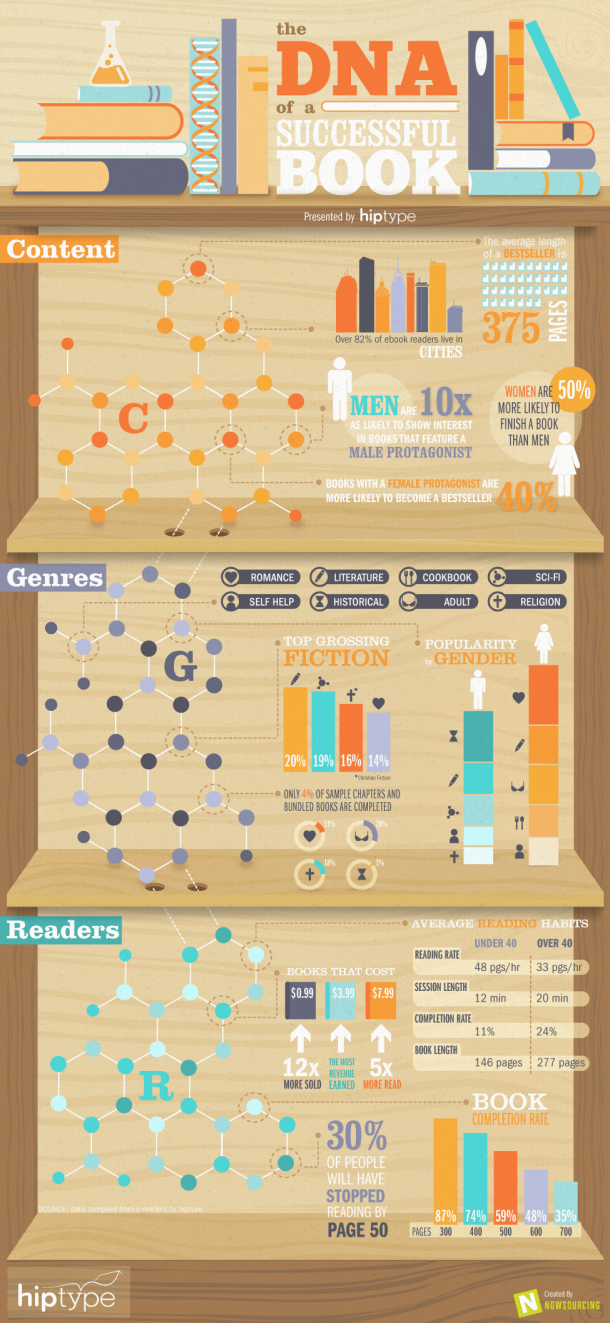Although here in blogland, it seems like everyone is reading e-books, the general public still reads more print books than e-books. According to this recent Pew Research Study, about 1 in 5 American adults read an e-book last year vs. about 7 in 10 reading any book last year. However, the rise of e-books is giving us a fantastic new avenue for book-related data. Reading a book on many e-readers lets publishers know which books people are completing and which books are just sitting on their virtual shelves.
Hiptype recently released a fantastic infographic, The DNA of a Successful Book, that dives into the publishing industry data. What stood out most to me is that books with a female protagonist are 40% more likely to become a bestseller. I wonder if that has to do with certain demographics reading more or if it is just a recent phenomenon. I also noticed that younger groups are reading faster – but I wonder if that means they’re skimming or if they’ve actually learned to read more quickly from being around so much data from such a young age. It also really took me aback that only 4% of sample chapters and bundled books are completed. I wonder which bundled books were part of the data sample and what that implies for the broader picture.
What stands out to you? What strikes you most about these little info bites? Do you know of any books that match or contradict this data?

Fascinating graphic – thanks for sharing. I find it interesting that books in the Religion category out-sold Romance.
I definitely wonder how everything was categorized. Thanks for visiting!
Reblogged this on LOVE INFOGRAPHICS.
Thanks for reblogging!
I found it interesting that books with female protagonists are 40% more likely to be a best-seller, and yet men are 10 times more likely to read one with a male protagonist. Seems a bit of a contradiction, but then again, maybe not, since women make up the majority of fiction readers.
I wonder if more women than men are speed readers and can consequently read more in a shorter period of time? Or if perhaps it’s really just that men are the ones reading all those ghastly boring biographies and other such nonfiction?
Very interesting information on publishing! Especially for an aspiring writer, the one that stood out for me was the knowledge that 30% of people will have stopped reading by page 50. That makes me think that the first 50 pages better be pretty engrossing.
That’s a great point — we’d better polish our first 50 pages til they shine!
I was struck by the fact that women apparently don’t read enough historical fiction or science fiction for those categories to appear on the genre chart by gender (unless I’m not understanding that chart correctly). No surprise that men are more into science fiction than women, but NO sci fi category for women at all?!
Also, where is fantasy? A huge category, I would think, but it doesn’t show up on the chart for female OR male readers.
Interesting post!
Yeah, I agree with you on the fantasy genre. I’ll pick that over sci fi any day.
I wonder if they were clumping science fiction and fantasy together. It seems like that happens often enough that it could be where the fantasy is hanging out on this chart.
Yeah, could be 🙂
I love these info graphics. It is interesting that more people in cities read e-books – is that because they are more likely to commute I wonder? Very interesting about the types of books that sell too…. Thanks for sharing this one!
I bet the e-books does have to do with commuting. Thanks for stopping by!
I work in a library and while e books are popular, the majority of people check out regular books. I’d say the most checkouts are romance or historical romance or historical fiction.
I definitely prefer regular books, unless I’m traveling. I’ve heard you get better reading comprehension with regular books as well. Thanks for visiting!
Interesting blog post and stats. Thanks!
Thanks for stopping by!
Very interesting. Thanks for sharing!
Thanks for visiting the blog!
Very informative! I’m especially hyped at the page length. I’m writing a long book. 🙂
If you can hook those readers, they’ll be begging for more pages. 🙂
I agree with you, that only 4% of the sample books and chapters are completed is concerning, I’d say. At least for the authors that have written the books and chapters in the data sample.
Then again, I volunteered to do book reviews for a Norwegian publishing house for a while and was sent sample copies of books they selected. I have to admit I struggled like hell. During the year or so that I did it, I only truly liked a couple of the books I read. I really struggled my way through the rest to try to have an opinion on them. No one of them were books that I’d probably select myself I was browsing through a bookshop looking for something to read. If I hadn’t promised to write a review I don’t think I would have finished them at all.
Oh, and I forgot to say that I love your blog! Very inspiring and motivating! Keep up the good work!
Reading books because you have to read them is just not the same as reading books because you want to read them; that must’ve been a rough read when you got books that you definitely wouldn’t have chosen yourself.
So glad you enjoy the blog! Thanks for stopping by!
Great comments. THanks for the graphic
Thanks for visiting!